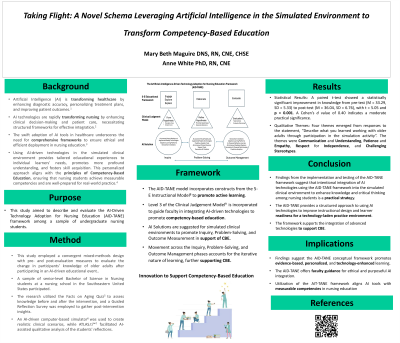Education
(14) Taking Flight: A Novel Schema Leveraging Artificial Intelligence in the Simulated Environment to Transform Competency-Based Education
Friday, June 20, 2025
2:15 PM - 3:15 PM MST
Location: Plaza Ballroom Foyer


Mary Beth R. Maguire, DNS, RN, CNE, CHSE
SimCapture Impact Manager
Laerdal Medical
Kennesaw, Georgia, United States- AW
Anne White, PhD, RN, CNE
Professor of Nursing
Kennesaw State University
Kennesaw, Georgia, United States
Lead Author(s)
Co-Author(s)
Abstract : Background/Gap:
Many nursing programs are radically transforming curricula to competency-based standards (AACN, 2023). Concurrent with a shift towards competence is a rapid acceleration of artificial intelligence (AI) technologies (DeGagne, 2023). These AI technologies can transform education by providing more personalized learning and improved efficiencies (Bozkurt et al., 2021). However, a gap exists between the effective integration of AI technologies and the achievement of competency-based standards.
Purpose Statement:
This study aimed to describe and evaluate the AI-Driven Technology Adoption for Nursing Education Model (AID-TANE).
Theoretical Framework:
The AID-TANE model incorporates constructs from the 5-E Instructional Model (BSCS, 2006) and Tanner’s Clinical Judgement Model (Tanner, 2006) to guide faculty in integrating AI-driven technologies to promote competency-based education.
Methods:
Inspired by the 5-Es Instructional Model, a three-phased educational approach of Instruction/Exploration, Application, and Evaluation was employed. To test the model, undergraduate nursing students (N=151) participated in the learning event. After interactive instruction and participation in an AI-driven screen-based simulated home visit with an older adult, AI-driven technologies were used to analyze the effectiveness of the learning event.
Results:
Participants completed a pre-post Geriatric Attitude Survey and an open-ended survey at the end of the simulation. A paired sample t-test compared scores and was statistically significant at the 0.10 significance level (t = 1.88, p = 0.06). Three themes emerged from the AI-generated survey coding: ageism, empathy, and communication. These were confirmed by random sampling.
Conclusion/Significance:
This study demonstrates that the AID-TANE model is an effective strategy for integrating AI technology in competency-based education.
Please include a short summary of your presentation that highlights why an attendee would want to participate in your session.: As nursing education shifts to competency-based standards, AI technologies offer personalized learning but face integration challenges. This study evaluated the AI-Driven Technology Adoption for Nursing Education (AID-TANE) model to guide AI integration. Undergraduate nursing students (N=151) participated in an AI-generated screen-based simulation. Results suggest the AID-TANE model supports AI use in competency-based education.
Many nursing programs are radically transforming curricula to competency-based standards (AACN, 2023). Concurrent with a shift towards competence is a rapid acceleration of artificial intelligence (AI) technologies (DeGagne, 2023). These AI technologies can transform education by providing more personalized learning and improved efficiencies (Bozkurt et al., 2021). However, a gap exists between the effective integration of AI technologies and the achievement of competency-based standards.
Purpose Statement:
This study aimed to describe and evaluate the AI-Driven Technology Adoption for Nursing Education Model (AID-TANE).
Theoretical Framework:
The AID-TANE model incorporates constructs from the 5-E Instructional Model (BSCS, 2006) and Tanner’s Clinical Judgement Model (Tanner, 2006) to guide faculty in integrating AI-driven technologies to promote competency-based education.
Methods:
Inspired by the 5-Es Instructional Model, a three-phased educational approach of Instruction/Exploration, Application, and Evaluation was employed. To test the model, undergraduate nursing students (N=151) participated in the learning event. After interactive instruction and participation in an AI-driven screen-based simulated home visit with an older adult, AI-driven technologies were used to analyze the effectiveness of the learning event.
Results:
Participants completed a pre-post Geriatric Attitude Survey and an open-ended survey at the end of the simulation. A paired sample t-test compared scores and was statistically significant at the 0.10 significance level (t = 1.88, p = 0.06). Three themes emerged from the AI-generated survey coding: ageism, empathy, and communication. These were confirmed by random sampling.
Conclusion/Significance:
This study demonstrates that the AID-TANE model is an effective strategy for integrating AI technology in competency-based education.
Please include a short summary of your presentation that highlights why an attendee would want to participate in your session.: As nursing education shifts to competency-based standards, AI technologies offer personalized learning but face integration challenges. This study evaluated the AI-Driven Technology Adoption for Nursing Education (AID-TANE) model to guide AI integration. Undergraduate nursing students (N=151) participated in an AI-generated screen-based simulation. Results suggest the AID-TANE model supports AI use in competency-based education.
Learning Objectives:
- After participating in this activity, participants will analyze the impact of artificial intelligence (AI) technologies on transforming nursing education through personalized learning and improved efficiency.
- After participating in this activity, participants will describe the components of the AI-Driven Technology Adoption for Nursing Education (AID-TANE) model and its theoretical basis.
- After participating in this activity, participants will evaluate the effectiveness of AI-driven technologies in promoting competency-based education through a three-phased approach of instruction, application, and evaluation.
- After participating in this activity, participants will interpret the findings from a study that utilized AI-driven technologies to assess the impact on nursing students' attitudes toward geriatric care.

